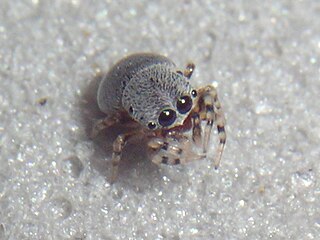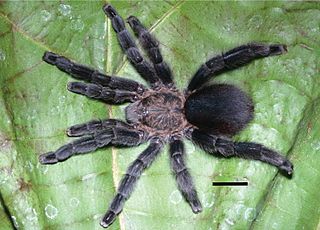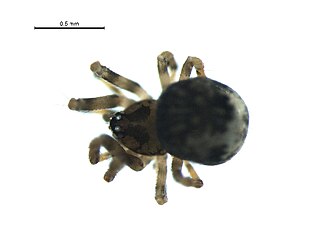 W
WAcanthepeira is a genus of orb-weaver spiders first described by George Marx in 1883.
 W
WThe tarantula spider Acanthoscurria brocklehursti, was a species described by F. O. Pickard-Cambridge (1896). It is now no longer valid, as following revision by Paula et al. it is now treated as a junior synonym Acanthoscurria theraphosoides [in Ausserer 1871].
 W
WAcragas longimanus is a species of jumping spider in the genus Acragas. It was first described in 1900 by Eugène Simon. These spiders are found in Brazil.
 W
WAvicularia caei is a species of spiders in the family Theraphosidae found in Brazil. It was first described in 2017. The specific name honours Carlos Eduardo Gurgel Paiola, known as "Caê".
 W
WAvicularia taunayi is a species of spider in the family Theraphosidae found in Brazil.
 W
WThe Brazilian red and white tarantula is a tarantula species that is native to Brazil.
 W
WThe Brazilian whiteknee tarantula is a species of tarantula from Brazil that is commonly kept as a pet.
 W
WCylistella is a genus of jumping spiders that was first described by Eugène Louis Simon in 1901.
 W
WDyschiriognatha is a genus of long-jawed orb-weavers that was first described by Eugène Louis Simon in 1893.
 W
WFufius lucasae is a spider in the family Cyrtaucheniidae, native to Brazil. It was first described in 2004 by Guadanucci and Indicatti. The specific name lucasae honours Sylvia M. Lucas.
 W
WGrammostola pulchra is a species of tarantula, native to Brazil. It is known for its solid black body, which makes it an appealing tarantula for the pet trade.
 W
WHetschkia is a monotypic genus of Brazilian comb-footed spiders containing the single species, Hetschkia gracilis. It was first described by Eugen von Keyserling in 1886, and is found in Brazil.
 W
WIridopelma is a genus of Brazilian tarantulas that was first described by Reginald Innes Pocock in 1901.
 W
WIsoctenus is a genus of South American wandering spiders first described by Philipp Bertkau in 1880.
 W
WLapsamita is a genus of spiders in the family Salticidae. It was first described in 2013 by Ruiz. As of 2017, it contains only one Brazilian species, Lapsamita maddisoni.
 W
WLasiodora difficilis, common name Brazilian red birdeater, is a species of tarantulas belonging to the family Theraphosidae.
 W
WThe Lasiodora klugi is a tarantula endemic to Brazil. Its common name refers to the state of Bahia.
 W
WLasiodora parahybana, the Brazilian salmon pink bird-eating tarantula, also simply known as the salmon pink or LP, is a tarantula from north-eastern Brazil and considered to be the third largest tarantula in the world.
 W
WLoxosceles gaucho commonly known in English as the gaucho spider. is a highly venomous recluse spider endemic to South America.
 W
WNhandu tripepii is a spider species, and is a theraphosine theraphosid. It is native to Brazil.
 W
WOchyrocera ungoliant is a species of spiders of the genus Ochyrocera. It is endemic to Brazil. It was named after Ungoliant, an evil spider spirit created by J.R.R. Tolkien, described in the book The Silmarillion.
 W
WPachistopelma is a genus of Brazilian tarantulas that was first described by Reginald Innes Pocock in 1901. As of May 2020 it contains two species, found in Brazil: P. bromelicola and P. rufonigrum. They have a straight front eye row and males have a spinose spur on the first tibia. Females have two spermathecae lacking lobes or constrictions that have a slight curvature in the middle.
 W
WPachistopelma bromelicola is a species of tarantula, contained within the Aviculariinae subfamily. It is endemic to Brazil.
 W
WPachistopelma rufonigrum is a species of theraphosid, contained within the Aviculariinae subfamily. It is endemic to Brazil.
 W
WPamphobeteus nigricolor is a large species of tarantula found in Colombia and Brazil. First described in 1875 by Anton Ausserer as Lasiodora nigricolor, in 1901 Reginald Innes Pocock moved it to the new genus Pamphobeteus, and designated it as the genus's type species.
 W
WPhysocyclus is a genus of cellar spiders that was first described by Eugène Louis Simon in 1893.
 W
WPseudicius is a genus of the jumping spiders first described by Eugène Simon in 1885. The name is combined of Greek pseudo "false" and the salticid genus name Icius. The small genus Wesolowskana should possibly be included in this genus. There is some dispute whether Afraflacilla is a distinct genus or should be included in Pseudicius. Festucula and Marchena are other close relatives, these genera form a monophyletic group.
 W
WPterinopelma is a genus of Brazilian tarantulas that was first described by Reginald Innes Pocock in 1901. As of May 2020 it contains three species, found in Brazil: P. felipeleitei, P. sazimai, and P. vitiosum. It was removed from the synonymy of Eupalaestrus in 2011.
 W
WPterinopelma sazimai is a species of tarantula. It is known as the Brazilian blue or Sazima's tarantula. Iridescent blue in color, P. sazimai is native to an ecological island within the Chapada Diamantina National Park in Bahia, Brazil. In 2012, it became the first Brazilian species to appear on the International Institute for Species Exploration's Top 10 New Species list. The specific epithet sazimai honors Ivan Sazima, a Brazilian zoologist who was the first to collect exemplars of the species. This species is endangered due to the destruction of its habitat and overcollecting for the illegal pet trade.
 W
WRhetenor is a genus of beetle mimicking jumping spiders that was first described by Eugène Louis Simon in 1902. As of August 2019 it contains only two species, found only in the United States and Brazil: R. diversipes and R. texanus. The name is a reference to Rhetnor, a character in Ovid's Metamorphoses.
 W
WStegodyphus is a genus of velvet spiders that was first described by Eugène Simon in 1873. They are distributed from Africa to Europe and Asia, with two species found in Brazil. The name is derived from Ancient Greek στέγω (stegos), meaning "covered".
 W
WTrogloneta is a genus of spurred orb-weavers that was first described by Eugène Louis Simon in 1922.
 W
WTyphochlaena is a genus of small-bodied tarantulas with an arboreal trapdoor lifestyle. All the species except for T. seladonia were first described by Rogério Bertani in 2012.
 W
WTyphochlaena curumim is a species of tarantula, that is native to Mata do Pau-Ferro, Areia, in the state of Paraiba, Brazil. It is a member of the subfamily Aviculariinae.
 W
WTyphochlaena paschoali is a species of tarantula, in the subfamily Aviculariinae. It is native to Brazil.
 W
WTyphochlaena seladonia is a species of aviculariine tarantula, and is the type species of the genus Typhochlaena. It is unique as an arboreal spider that constructs trapdoors in the bark of trees.
 W
WYbyrapora is a genus of spiders in the family Theraphosidae (tarantulas), found in Brazil. Its species were formerly placed in the genus Avicularia.
 W
WYbyrapora diversipes is a species of spider in the family Theraphosidae found in Brazil.
 W
WYbyrapora gamba is a species of spider in the family Theraphosidae, found in Brazil.
 W
WYbyrapora sooretama is a species of spider in the family Theraphosidae, found in Brazil.